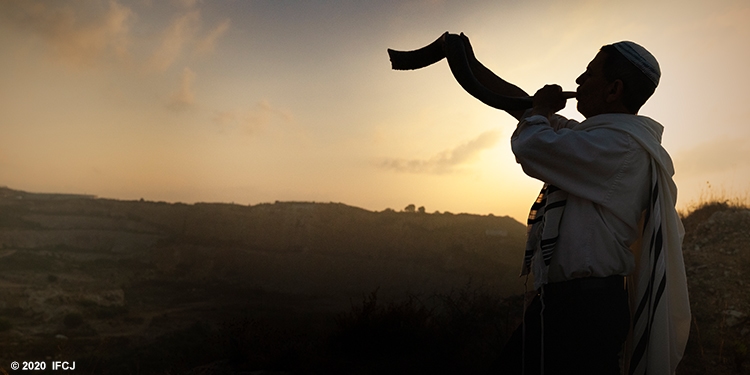Three Messages of the Trumpet
Yael Eckstein | September 15, 2023

The LORD said to Moses, “Say to the Israelites: ‘On the first day of the seventh month you are to have a day of sabbath rest, a sacred assembly commemorated with trumpet blasts.’” — Leviticus 23:23–24
Today at sundown, my family will join Jews around the world in celebrating Rosh Hashanah, the Jewish New Year. Because it is a non-working holiday, these devotions were prepared for you in advance.
Rosh Hashanah is identified in the Bible as “a day for you to sound the trumpets.” Indeed, Rosh Hashanah has become known for the object that symbolizes it the most: the trumpet, or in Hebrew, the shofar. The shofar has several different meanings, and together they comprise the essence of this most sacred day.
Over the course of Rosh Hashanah, the shofar is sounded in three different ways. The tekiah blast is one long sound. The shevarim blast is comprised of three slightly shorter notes. And the teruah blast contains nine short staccato blasts blown in quick succession. The three ways of blowing the shofar symbolize the three messages of the trumpet that we are meant to understand on the days on which it is blown.
Three Messages of the Trumpet
The long singular tekiah blast reminds us of royalty. When a king enters a place, trumpets are blown to signal his presence. Similarly, on Rosh Hashanah, the King of the world is present. Every year, on Rosh Hashanah, we coronate our King all over again. We recognize that the Lord, our God, is King, and we acknowledge His dominion over the world. Message number one is that God, and God alone, rules the world.
Message number two is represented by the three-part shevarim sound, closely resembling the sound of weeping. This distinct blast reminds us that our lives, and everything that we hold dear, hang by a single thread held by the Master of the universe. In the blink of an eye it could all disappear! That’s why we cry. Yet our brokenness leads us to wholeness when we pray to God, asking that He bless us for yet another year. We remember that He is our loving Father and that He will answer our prayers.
The final message—the nine short teruah blasts—are reminiscent of an alarm clock, and their purpose is to wake us from our slumber. All year long we get caught up in the humdrum of life. We begin to forget the purpose of it all. Once a year we make a point to wake up and remember that we are here for a specific purpose. During the High Holy Days, we reassess our lives and make any necessary changes.
Together, the three distinct types sounds and the three messages of the trumpet bring us to a deep understanding of what the holiday is all about. Rosh Hashanah means the “head of the year” because it is on that day that we define which way our year is headed. When we recognize that God is the King who directs our lives and we adjust our lives to reflect that truth, we will have set the New Year in the right direction.
Your Turn:
Which of the three messages of the shofar do you need to hear today? Share your answer in the space below!
